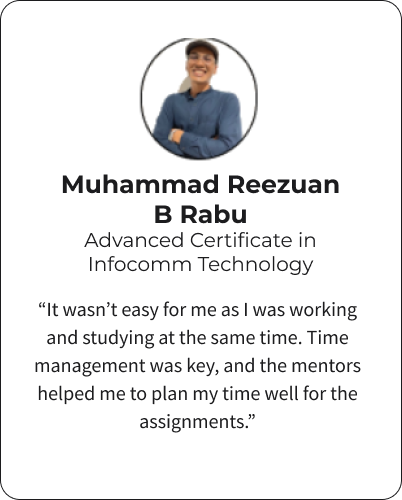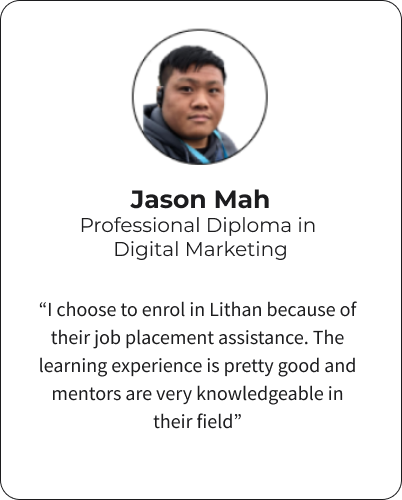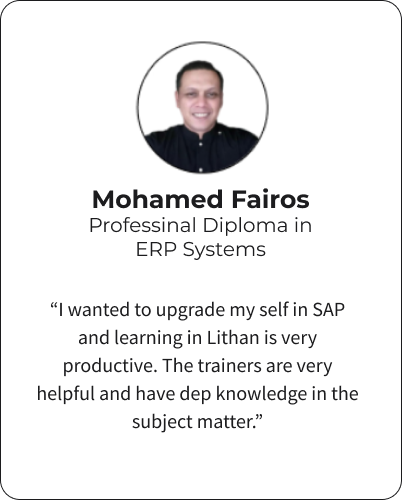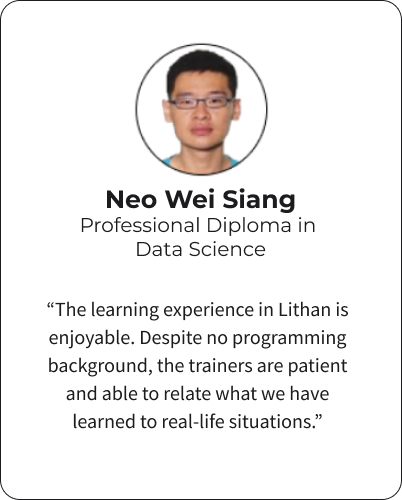Computer Science for unimarconi
- Homepage
- Computer Science for unimarconi


Why pursue a Master in Computer Science?

Academic qualifications still matter
A quick scan of popular job portals shows that the prerequisite for many PME roles is minimally a bachelor’s or master’s degree qualification. Master’s holders certainly have the edge.

Higher degree graduates are 100 times more rare
33% of locals are bachelor’s degree holders whereas only 0.3% are graduates of higher degrees*, resulting in master’s degree graduates having an academic advantage over most workplace peers and job applicants.
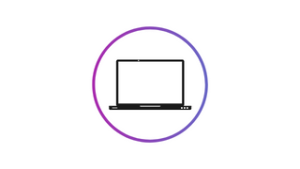
The IT & digital sector is booming post Covid
Singapore went through 5 years’ equivalent of digital transformation in the first 8 weeks of the pandemic¹, resulting in the need for an additional 1.2 million digital experts in the country by 2025². A Master’s in Computer Science will help you take advantage of this sky-high demand, especially with up to 92% of businesses in Southeast Asia countries continue to spend more on cloud computing³, driving it to be one of the most in-demand skills by 2025⁴.
¹Source: Mckinsey.com
² ⁴Source: Report from Amazon Web Services (AWS)
³IDC
Why pursue a Master in Computer Science?

Academic qualifications still matter
A quick scan of popular job portals shows that the prerequisite for many PME roles is minimally a bachelor’s or master’s degree qualification. Master’s holders certainly have the edge.

Higher degree graduates are 100 times more rare
33% of locals are bachelor’s degree holders whereas only 0.3% are graduates of higher degrees*, resulting in master’s degree graduates having an academic advantage over most workplace peers and job applicants.

The IT & digital sector is booming post Covid
Singapore went through 5 years’ equivalent of digital transformation in the first 8 weeks of the pandemic¹, resulting in the need for an additional 1.2 million digital experts in the country by 2025². A Master’s in Computer Science will help you take advantage of this sky-high demand, especially with up to 92% of businesses in Southeast Asia countries continue to spend more on cloud computing³, driving it to be one of the most in-demand skills by 2025⁴.
² ⁴Source: Report from Amazon Web Services (AWS)
³IDC
Why choose us

High Affordability

Non-invasive training schedule
Our blended learning delivery through a combination of self-paced learning, instructor-led flipped classes and personalised mentoring reduces in-class time commitment.

More than 10 years of Job Placement Success
Tap on our job placement assistance, backed by more than 10 years of proven track record, to gain cloud computing job opportunities even before you graduate!
Why choose us

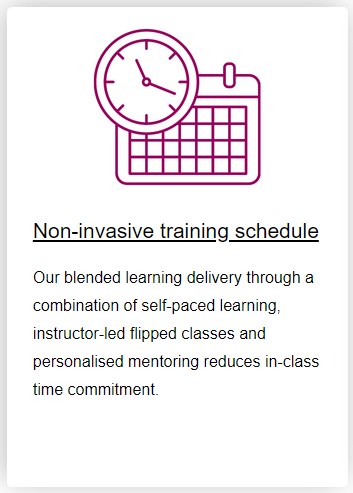
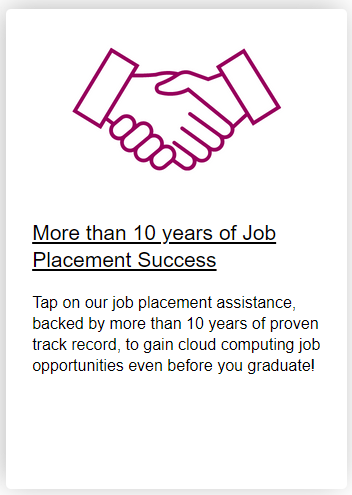
Course Details
Course Details

Prerequisite
Minimum 21 years old with a bachelor’s degree in any field from a recognized university OR
Mature candidate of 30 years and above with 8 years of relevant work experience.

Prerequisite
Minimum 21 years old with a bachelor’s degree in any field from a recognized university OR
Mature candidate of 30 years and above with 8 years of relevant work experience.
Modules
Learners will begin by mastering the installation of the Windows client operating system, as well as configuring authorization, authentication, networking, storage, and data access. They will also learn essential tasks such as managing applications, Windows updates, and configuring threat protection to ensure the security of the operating system. Additionally, they will also develop the skills needed to support and troubleshoot the Windows client environment, including hardware, drivers, and resolving operating system issues.
Learners will gain expertise in planning operating system deployment strategies, considering factors such as compatibility, scalability, and security. They will also learn to manage user identity, access, and applications, ensuring effective user management and secure access control. Additionally, learners will develop skills in managing compliance policies and configuration profiles, maintaining regulatory standards, and enforcing desired system configurations.
Learners will first gain a solid understanding of cloud concepts, including the definition, benefits, and characteristics of cloud computing. They will also explore cloud architecture and the different components that make up a cloud infrastructure. Additionally, learners will examine various cloud services and their use cases, enabling them to assess which services are most suitable for different scenarios. This module also covers cost management in Microsoft cloud computing platform, Azure, providing learners with the skills to optimize cloud costs and utilize budgeting and monitoring tools effectively. Lastly, learners will explore cloud management and governance, including best practices for maintaining security, compliance, and performance in a cloud environment.
This module equips learners with the knowledge and skills needed to excel in diverse aspects of managing databases. They will gain a comprehensive understanding of organizing data, database design concepts, entity-relationship modeling, normalization techniques, data definition, retrieval, maintenance, testing, and documentation. By engaging in practical exercises and hands-on activities, learners develop proficiency in planning database use groups, developing conceptual, logical, and physical designs, writing optimised queries and stored procedures, and conducting thorough testing. They will also gain documentation skills to communicate database schemas, entities, relationships, and data dictionaries for collaboration and maintenance purposes.
This module will cover fundamental principles such as programming languages, paradigms, and program execution, establishing a strong foundation in programming concepts and terminology that enhances learners’ ability to comprehend and test code. By engaging in practical exercises and hands-on activities, learners develop problem-solving skills and critical thinking abilities, improving their coding proficiency and enabling them to write efficient and well-structured code.
Learners will acquire the necessary knowledge and skills to develop enterprise level applications to meet the organisational needs. Throughout this module, learners will acquire comprehensive knowledge of key concepts such as enterprise application architecture, business logic implementation, integration techniques, user interface development, and the testing, deployment, and maintenance of enterprise applications.
Learners will learn to identify and comprehend different Agile management frameworks, including their principles, values, and methodologies. They will gain the skills to implement Agile project management practices, including Scrum ceremonies, artifact management, and iterative planning. Additionally, they will develop the expertise to build high-performing Agile teams, fostering collaboration, communication, and continuous improvement. Learners will also acquire the ability to effectively plan and implement Agile projects, breaking down requirements, prioritizing work, and adapting plans based on feedback and changing project needs.
This module entails an extensive project where learners leverage their expertise to conceive, create, and deploy a practical enterprise application that optimizes business processes, unifies data, and integrates disparate systems into a cohesive environment, that enhance organizational efficiency and productivity. The project commences with a meticulous requirements gathering and analysis, and close collaboration with stakeholders to establish clear project objectives. Drawing upon their solid foundation in enterprise architecture design, development, integration techniques, testing methodologies, and problem management principles, learners will proceed with front-end, middleware, and back-end components development. They will conduct rigorous testing to ensure application quality, and fix the issues by considering scalability, security, and performance optimization before promoting the application to the production environment.
Course fee and funding breakdown
Guglielmo Marconi University
Today UniMarconi is chosen by over 80,000 students and considered among the best institutions for e-learning, for its overall learning level, for its relationship with the professional and labour market as well as the international benchmark for research and scientific cooperation agreements.
To find out more about the university, please visit https://www.unimarconi.com/ Or Download the brochure here
Guglielmo Marconi University
Today UniMarconi is chosen by over 80,000 students and considered among the best institutions for e-learning, for its overall learning level, for its relationship with the professional and labour market as well as the international benchmark for research and scientific cooperation agreements.
To find out more about the university, please visit https://www.unimarconi.com/ Or Download the brochure here
Achievements and Rankings
Ranked 79th overall by the Complete University Guide 2022
Ranked as the best modern university in London in the Times Good University Guide 2022
Ranked 2nd in London for Food Science in the 2021 Times and Sunday Times Good University Guide
Ranked 5th in London for overall student satisfaction in the National Student Survey 2020
Ranked 801-1000th in World University Rankings 2021 according to Times Higher Education
Top 300 European Teaching rankings 2019 by the Times Higher Education
Ranked 201-250th by Young University Rankings 2020
Jointly ranked as the best modern university in the country for research quality (Research Excellence Framework 2021)
¹Source: 2014 Research Excellence Framework
Achievements and Rankings
Ranked 79th overall by the Complete University Guide 2022
Ranked as the best modern university in London in the Times Good University Guide 2022
Ranked 2nd in London for Food Science in the 2021 Times and Sunday Times Good University Guide
Ranked 5th in London for overall student satisfaction in the National Student Survey 2020
Ranked 801-1000th in World University Rankings 2021 according to Times Higher Education
Top 300 European Teaching rankings 2019 by the Times Higher Education
Ranked 201-250th by Young University Rankings 2020
Jointly ranked as the best modern university in the country for research quality (Research Excellence Framework 2021)
¹Source: 2014 Research Excellence Framework
About Lithan
100 campuses across Asia
Accredited by the Singapore government as a CET Centre (Continuing Education and Training)
Edutrust certified by Committee for Private Education (CPE)
Internationally accredited by Pearson UK and Scottish Qualifications Authority (SQA)
About Lithan
100 campuses across Asia
Accredited by the Singapore government as a CET Centre (Continuing Education and Training)
Edutrust certified by Committee for Private Education (CPE)
Internationally accredited by Pearson UK and Scottish Qualifications Authority (SQA)
Awards and Accreditations
Microsoft Global Learning Partner of the Year Award (Finalist)
Pearson’s BTEC College of the Year 2019 Award for Asia
Dun&bradstreet’s Business Eminence Award 2020
Flame Innovation Award 2019 by SkillsFuture Singapore
APAC CIO Outlook’s Top 10 Provider of Education Tech Solution
Awards and Accreditations
Microsoft Global Learning Partner of the Year Award (Finalist)
Pearson’s BTEC College of the Year 2019 Award for Asia
Dun&bradstreet’s Business Eminence Award 2020
Flame Innovation Award 2019 by SkillsFuture Singapore
APAC CIO Outlook’s Top 10 Provider of Education Tech Solution
Student Testimonials


